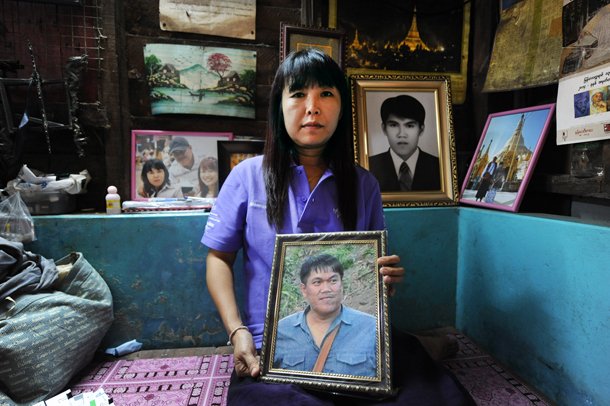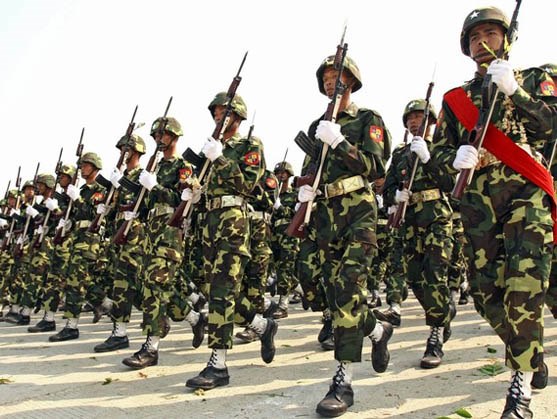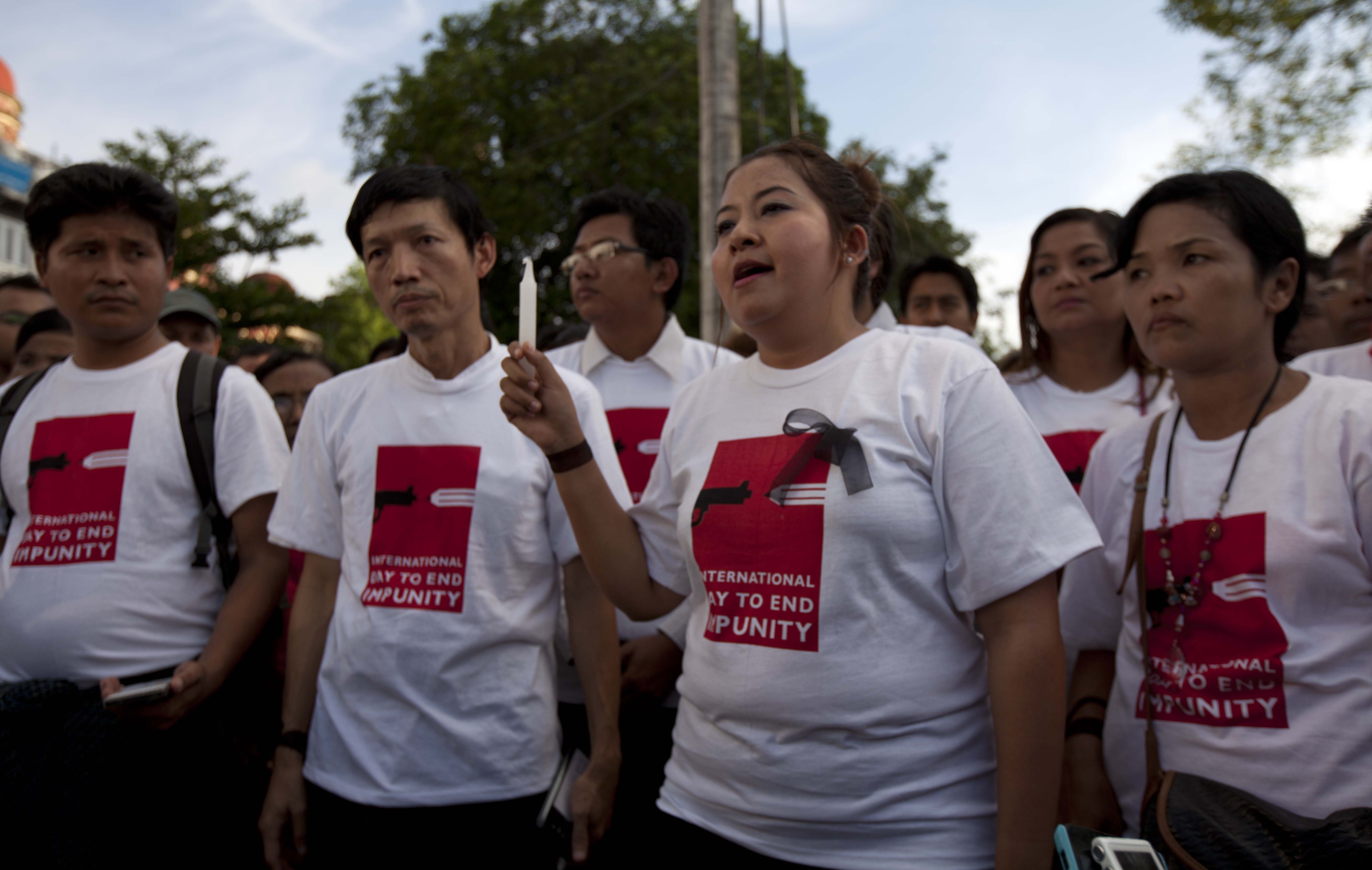Posts Tagged ‘Ko Par Gyi aka Aung Kyaw Naing’ (17 found)
WORLD REPORT 2015
Burma
The reform process in Burma experienced significant slowdowns and in some cases reversals of basic freedoms and democratic progress in 2014. The government continued to pass laws with significant human rights limitations, failed to address calls for constitutional reform ahead of the 2015 elections, and increased arrests of peaceful critics, including land protesters and journalists […]
• • •More Murders, Same Patterns as Burma Army Acts with Impunity
 Yet another astonishing act of barbarity was committed by the Burma Army as two young ethnic Kachin teachers were raped and murdered in a village in northern Shan State. Unfortunately, this is not an isolated case as this incident once again demonstrates the impunity that protects the perpetrators of such cruel acts.
Yet another astonishing act of barbarity was committed by the Burma Army as two young ethnic Kachin teachers were raped and murdered in a village in northern Shan State. Unfortunately, this is not an isolated case as this incident once again demonstrates the impunity that protects the perpetrators of such cruel acts.
According to Kachin Women’s Association – Thailand, (KWAT) Burma Army troops had arrived in the village of Kawng Kha Shabuk, near the town of Muse, northern Shan State on the morning of 19 January 2015. They had previously been involved in military operations against the Kachin Independence Army (KIA). In the early hours of the morning, villagers heard screaming from the church compound where the two teachers were staying. They went to check but could not ascertain what had happened. The next morning, a neighbor went to the compound to find the two teachers dead with signs of sexual assault and of being viciously beaten. Boot marks were found nearby their living quarters. According to KWAT, “There is strong circumstantial evidence that the rape and killing was carried out by the Burma Army troops which had arrived on January 19. These troops were stationed on guard around the village, and no one else would have dared carry out these crimes with the soldiers present.” […]
• • •Statement of the Special Rapporteur on the Situation of Human Rights in Myanmar
Today is the final day of my second official visit to Myanmar as Special Rapporteur on the situation of human rights in Myanmar. It has been a visit rich in its diversity, geography, viewpoints and experiences. I have engaged with government officials, parliamentarians, religious and community leaders, civil society representatives, victims of human rights violations and members of the international community. My discussions have been frank, open, sometimes passionate but always welcoming. I am feeling more and more a part of this country and am privileged to be accompanying the people of Myanmar on this journey of reform towards greater enjoyment of human rights. My visit would not have been possible without the genuine cooperation of the Government of Myanmar and the committed support of the United Nations Country Team. I wish to express my sincere appreciation to both organisations […]
• • •As the Burma Army Fires Live Rounds, the MNHRC Fires Blanks
 The Myanmar National Human Rights Commission (MNHRC) once again proved the futility of its existence with a deeply unsatisfactory investigation into the murder of journalist Aung Kyaw Naing, a.k.a. Ko Par Gyi by the Burma Army. Rather than providing meaningful avenues for redress for the victim and his family, the investigation report serves to act as a cover for the Burma Army, which is continuing to commit such human rights abuses throughout Burma’s ethnic areas.
The Myanmar National Human Rights Commission (MNHRC) once again proved the futility of its existence with a deeply unsatisfactory investigation into the murder of journalist Aung Kyaw Naing, a.k.a. Ko Par Gyi by the Burma Army. Rather than providing meaningful avenues for redress for the victim and his family, the investigation report serves to act as a cover for the Burma Army, which is continuing to commit such human rights abuses throughout Burma’s ethnic areas.
Ko Par Gyi was a freelance journalist covering the conflict between the Democratic Karen Benevolent Army (DKBA) and the Burma Army when he was taken into military custody. Five days later he was tortured before being shot to death. The marks of torture were obvious to Ma Thandar, Ko Par Gyi’s wife, when she viewed the dead body. After calls from human rights groups as well as the US State Department, for an independent investigation, President Thein Sein consequently asked the MNHRC to conduct an investigation, the results of which were released on 2 December 2014.
The MNRHC investigation report, however, does not address the key issues surrounding this case, is full of inconsistencies, and does not include key pieces of evidence. It does not provide any explanation of the signs of torture that were clear on his body. The report claims that there had been a fight in which the gun had gone off; however, according to forensic experts that Ko Par Gyi’s wife has spoken to, he had been shot five times, one of which was point blank through the chin, implying that he had been shot four times before being killed. […]
• • •[Burma] Government Using New Media Law to Stifle Criticism
SEAPA views with utmost concern the latest move of the Ministry of Information (MOI) in Myanmar to pursue legal action against the Myanmar Thandawsint (Myanmar Herald) using the new Media Law for publishing scathing commentary about the words of President Thein Sein. […]
• • •Impunity for Military Abuses Has to End
 On 7 November, the International Human Rights Clinic (the Clinic) at Harvard Law School published a Legal Memorandum which establishes that certain Burma Army commanders are guilty of crimes against humanity and war crimes under international criminal law. The Legal Memorandum submits its findings on the basis of a three-year investigation (the Investigation) into human rights abuses associated with a Burma Army offensive in Karen State, which was launched in late 2005 and continued into 2008 (the Offensive). The Clinic chose this offensive “because it was one of the largest in recent memory and was widely condemned by the international community.” The Investigation focused specifically on the conduct of two military units – Southern Regional Military Command (SRMC) and Light Infantry Division 66 (LID 66) – in Thandaung Township, Karen State.
On 7 November, the International Human Rights Clinic (the Clinic) at Harvard Law School published a Legal Memorandum which establishes that certain Burma Army commanders are guilty of crimes against humanity and war crimes under international criminal law. The Legal Memorandum submits its findings on the basis of a three-year investigation (the Investigation) into human rights abuses associated with a Burma Army offensive in Karen State, which was launched in late 2005 and continued into 2008 (the Offensive). The Clinic chose this offensive “because it was one of the largest in recent memory and was widely condemned by the international community.” The Investigation focused specifically on the conduct of two military units – Southern Regional Military Command (SRMC) and Light Infantry Division 66 (LID 66) – in Thandaung Township, Karen State.
Articles 7 and 8 of the Rome Statute of the International Criminal Court (ICC) set out the legal requirements for an action to qualify as a “crime against humanity” or a “war crime,” respectively. The essence of a “crime against humanity” is that the act in question should be “part of a widespread and systematic attack directed against any civilian population, with knowledge of the attack.” Similarly, Article 8 stipulates that a “war crime” must be committed “as part of a plan or policy or as part of a large-scale commission of such crimes,” and must constitute a grave breach of the Geneva Conventions 1949, which regulate the conduct of armed conflict […]
• • •Par Gyi Killing Highlights Continuing Impunity in Southeast Myanmar
The recent killing by the Myanmar Army of the journalist Aung Kyaw Naing, also known as Par Gyi, highlights the need to end impunity in Southeast Myanmar, according to the Karen Human Rights Group (KHRG), a leading community based organisation in the region. […]
• • •Burmese Journalists Call for Govt Protection
 Burmese journalists took to the streets in Rangoon on Sunday to mark the UN International Day to End Impunity For Crimes Against Journalists. The demonstration was staged to send a message to the Thein Sein government to take active measures to protect reporters within the country.
Burmese journalists took to the streets in Rangoon on Sunday to mark the UN International Day to End Impunity For Crimes Against Journalists. The demonstration was staged to send a message to the Thein Sein government to take active measures to protect reporters within the country.
About 100 demonstrators gathered in solidarity in front of Rangoon City Hall wearing black wrist bands to protest what they say is an ongoing repression of media freedom in Burma and the continuing arrest of reporters […]
• •Myanmar: Ensure Independent and Impartial Investigation into Death of Journalist
The Myanmar authorities must ensure a comprehensive, independent, impartial and effective investigation into the death of journalist Aung Kyaw Naing, aka Par Gyi, who was reportedly killed while in the custody of the Myanmar Army in Mon State, Eastern Myanmar, earlier this month. Failure to adequately ? and transparently ? investigate such serious allegations and hold perpetrators to account would further entrench impunity in the country, and have a chilling effect on other journalists […]
• • •ကိုေအာင္ေက်ာ္ႏိုင္ (ခ) ကိုပါႀကီးအား အစေဖ်ာက္ သုတ္သင္ျခင္း၊ ဥပေဒမဲ့ သတ္ျဖတ္ျခင္းအား ကန္႔ကြက္႐ႈံ႕ခ်ျခင္း
၂၀၁၄ ခုႏွစ္၊ စက္တင္ဘာလ (၃၀) ရက္ေန႔က က်ိဳက္မေရာၿမိဳ႕ စက္ေလွဆိပ္ တြင္ ျမန္မာစစ္တပ္က အလြတ္တန္း သတင္းေထာက္ ကိုေအာင္ေက်ာ္ႏိုင္ (ခ) ကိုပါႀကီးအား ဖမ္းဆီးခဲ့ပါသည္။ ထို႔ေနာက္ ျမန္မာ့ တပ္မေတာ္ ေျချမန္ တပ္ရင္း ၂၀၈တြင္ ခ်ဳပ္ေႏွာင္ဖမ္းဆီး၍ စစ္ေဆး ေမးျမန္းသည္ဟု သိရပါသည္။ ၄င္းေနာက္ ေအာက္တိုဘာ ၂၃ ရက္ေန႔တြင္ ျမန္မာႏိုင္ငံ စာနယ္ဇင္းေကာင္စီ (ယာယီ) မွေန၍ ေၾကညာခ်က္တစ္ေစာင္ ထုတ္ျပန္ခဲ့ပါသည္။ […]
• • •








 All posts
All posts